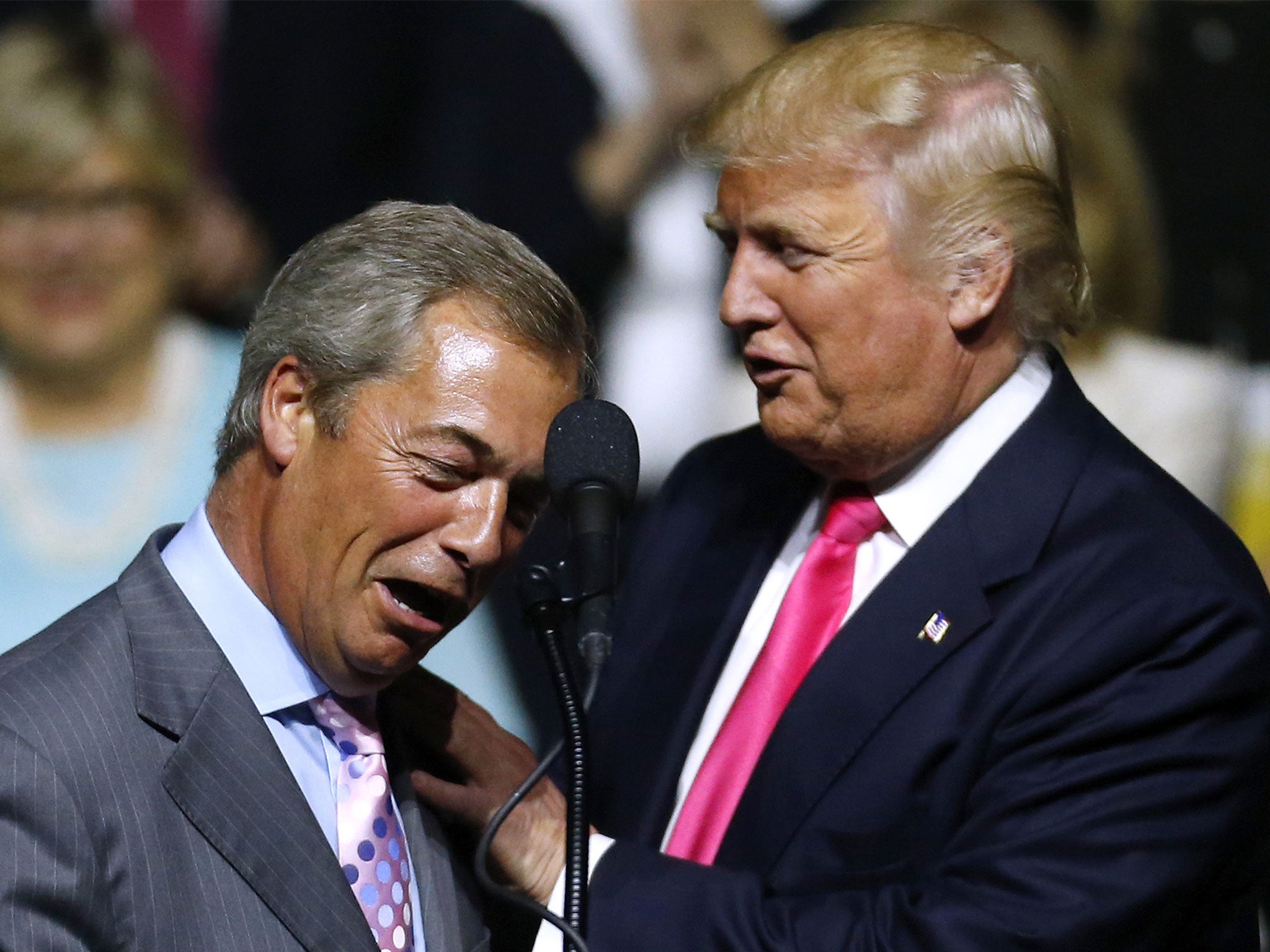I was the first Muslim ever elected to US Congress — and what I see happening in the UK scares me
Why wouldn't Donald Trump meet with Nigel Farage privately? They have similar friends and strategies, after all

I’ve seen personally what hate looks like. Back in the 1990s, as a young criminal defense attorney, I represented young men in two different cases who were eventually acquitted after being charged for defending themselves against white supremacists.
Ever since then, I’ve closely followed how the far right’s language and images have leached into society; how it tries to justify its existence while concealing its violence; and how it’s become a globally connected movement.
Recently, we’ve seen white supremacist violence escalate dramatically around the world, from the Pittsburgh and San Diego synagogue shootings to the murder at the anti-racist Charlottesville rally in the US; from the Christchurch mosque massacre in New Zealand to last month’s surgical assassination of liberal German politician Walter Lübcke.
Not only did these killers share an ideology, but they drew inspiration from and celebrated each other. Despite this, under Donald Trump’s leadership, the FBI and Department of Justice have deprioritised investigating far-right violence.
These seemingly disconnected events are part and parcel of an emerging, global far-right movement whose core ideology is anathema to democracy. It uses nationalism as its cover, but make no mistake: its basic value is white supremacy.
We see this on both sides of the Atlantic. On one side, there’s Nigel Farage, the Brexit Party leader with documented connections to racists and anti-Semites, who has openly courted and consorted with white nationalist parties in other nations. That didn’t stop Trump from meeting privately with Farage on his June trip to London. Why would it?
On the other side of the Atlantic, senior officials in the Trump administration like National Security Advisor John Bolton have openly aligned themselves with and promoted Islamophobia and white nationalism. He and other government officials have ties to a vast web of Islamophobic think-tanks and websites which amplify these ideologies.
Someone who directly connects Farage and Trump is former Trump advisor Steve Bannon. The same Steve Bannon who told an openly white supremacist conference that they should wear the label of racist as a “badge of honor”, and who also once pitched Farage on fronting a global alliance of far-right politicians like Hungary’s authoritarian Viktor Orban and the Philippines’ murderous Rodrigo Duterte.
It’s no wonder that hate crimes have surged in Britain and America after the 2016 Brexit vote and US presidential election, or that they’re surging across the world. These crimes are united by so-called “replacement” theory. The theory — which the Christchurch ‘Preacher of Hate’ used to justify his acts — claims that European whites are being “systematically replaced by non-European people, mainly Arabs and Berbers from the Middle East, North Africa and sub-Saharan Africa.” The San Diego synagogue shooter cited the Christchurch terrorist’s logic as his inspiration. White nationalist protesters in Charlottesville chanted, “Jews will not replace us.”
We must vigilantly and consistently counter each of these acts of violence and expressions of hate in our communities on the ground. People of good will in my state of Minnesota, where I serve as Attorney General, are doing just that. But we have the opportunity — and the obligation — to do more.
Just as hate is now a global movement, resistance needs to be global as well. We can only defeat this resurgence of white nationalism by building a new global, multicultural, multi-racial resistance that operates swiftly and effectively across borders. Organisers, advocates, and civil society organisations, as well as political parties, donors, and politicians, need to start connecting with each other about the threat, and how they can coordinate powerful responses.
That’s why I’m writing this from London, where I’m connecting with senior parliamentarians from across the political divide. My message to them is simple: we can agree to disagree on many topics, but we should seize the opportunity to take a united stand against the forces of hate and build a global resistance together.
In Britain, North America, and across Europe, we also need to recognise and respond to two important facts. First, that Islamophobia, anti-Semitism, and racism are tools that the global right are actively stoking in every country to divide marginalized communities from each other and to keep them from organising together.
Second, that the global right has harnessed legitimate fears and anxieties of low- and middle-income white Britons, Americans, and Europeans about being increasingly economically marginalized, and has weaponized them effectively into increasing tolerance for white nationalism.
Look no further than Farage and Trump. We can’t counter that weaponization just by telling white people that their fears are wrong and anxieties misplaced. We can counter it only by listening deeply and genuinely, especially to folks in rural areas, and proposing solutions that put their legitimate interests on the side of the marginalized; thereby wrenching them away from both white nationalists and an unjust economic order that benefits from their fear.
Yes, this is a dangerous time: our democracies are under assault and people’s lives are being lost. But we cannot afford the luxury of despair. Our people and our democracies are depending on us to fight the global movement of hate with an interconnected, global resistance of solidarity and love. Let the connecting begin.
Keith Ellison is the first Muslim elected to US Congress, former six-term US Representative for Minnesota and former Deputy Chairman of the Democrat National Committee. He is the Attorney General of Minnesota

Join our commenting forum
Join thought-provoking conversations, follow other Independent readers and see their replies